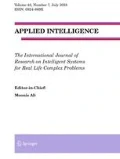Abstract
Web Services being the predominant aspect of the web, plays an inevitable role in everyday digital life.With an upsurge in web services, the process of combining them to solve a user query has become complicated. Investigators have proposed the usage of various techniques like Artificial Intelligence, Machine Learning and others to solve the problem of service composition which till date has serious unaddressed flaws. This leads to the need of a new intelligent framework capable of reducing the problem dimension which leads to a well structured composition process. This article proposes a novel framework that incorporates the usage of Formal Concept Analysis and Reinforcement Learning to compose the semantic web services thereby providing an efficient solution to the user query. The novelty of the work lies in the usage of Formal Concept Analysis which reduces the complexity of the composition search space thereby making the composition process effective. This article also utilizes the Reinforcement Learning technique with a relatively new reward model which encompasses the semantic input and output to determine the underlying pattern. The proposed framework is tested for the best Reinforcement Learning strategy through rigorous experimentation and the best Reinforcement Learning Algorithm is incorporated into the Intelligent Framework. The novel framework is evaluated using various queries belonging to varied domains to test its reliability and robustness. It is evident from the results that the proposed framework is efficient when compared with the state of art works and is more suitable for real-time service composition.














Similar content being viewed by others
References
Collection of owl-s web services (2006). http://www.andreas-hess.info/projects/annotator/owl-ds.html
Collection of owls-slr web services (2009). http://lpis.csd.auth.gr/systems/OWLS-SLR/datasets.html
Abid A, Rouached M, Messai N (2020) Semantic web service composition using semantic similarity measures and formal concept analysis. Multimed Tools Appl 79(9):6569–6597
Amudhavel J, Prabu U, Inbavalli P, Moganarangan N, Ravishankar V, Baskaran R, Dhavachelvan P (2016) Survey and analysis of web service composition strategies: A state of art performance study. Indian J Sci Technol 9(11):1-10
Bekkouche A, Benslimane SM, Huchard M, Tibermacine C, Hadjila F, Merzoug M (2017) Qos-aware optimal and automated semantic web service composition with user’s constraints. SOCA 11(2):183–201
Drupal: Project usage overview (2020). https://www.drupal.org/project/usage
Ganter B, Obiedkov S (2018) Conceptual exploration. Springer, Berlin
Ganter B, Wille R, Franzke C (2006) Formal concept analysis: mathematical foundations. Springer-Verlag, Berlin
Huo Y, Qiu P, Zhai J, Fan D, Peng H (2018) Multi-objective service composition model based on cost-effective optimization. Appl Intell 48(3):651–669
Kashyap N, Kumari AC, Chhikara R (2020) Service composition in iot using genetic algorithm and particle swarm optimization. Open Comput Sci 10(1):56–64
Lei Y, Jiantao Z, Fengqi W, Yongqiang G, Bo Y (2015) Web service composition based on reinforcement learning. In: 2015 IEEE International conference on web services, pp 731–734. IEEE
Liu ZZ, Chu DH, Jia ZP, Shen JQ, Wang L (2016) Two-stage approach for reliable dynamic web service composition. Knowl-Based Syst 97:123–143
Luis Felipe Cabrera CK (2005) Web Services Architecture and Its Specifications: Essentials for Understanding WS-*. Pro-Developer. Microsoft Press
Redbooks I (2004) Patterns: Service Oriented Architecture And Web Services Ibm
Ren L, Wang W, Xu H (2017) A reinforcement learning method for constraint-satisfied services composition. IEEE Transactions on Services Computing
Sutton RS, Barto AG (2018) Reinforcement Learning: An Introduction, 2 edn. Adaptive Computation and Machine Learning, The MIT Press
Rodriguez-Mier P, Pedrinaci C, Lama M, Mucientes M (2015) An integrated semantic web service discovery and composition framework. IEEE Trans Serv Comput 9(4):537–550
Ruby LRS (2007) RESTful web services O’Reilly
Souri A, Rahmani AM, Jafari Navimipour N (2018) Formal verification approaches in the web service composition: a comprehensive analysis of the current challenges for future research. Int J Commun Syst 31(17):e3808
Swetha NGG (2017) Web service composition using fluent calculus and verification using casual link matrix. In: National conference on ambient intelligent and smart environments, pp 39–44. PSG CT
Uc-Cetina V, Moo-Mena F, Hernandez-Ucan R (2015) Composition of web services using markov decision processes and dynamic programming. Sci World J 2015
UDDI: Universal description, discovery, and integration (uddi) (2020). http://xml.coverpages.org/uddi.html
Wang H, Huang G, Yu Q (2016) Automatic hierarchical reinforcement learning for efficient large-scale service composition. In: 2016 IEEE international conference on web services (ICWS), pp 57–64. IEEE
Wang H, Li J, Yu Q, Hong T, Yan J, Zhao W (2020) Integrating recurrent neural networks and reinforcement learning for dynamic service composition. Futur Gener Comput Syst 107:551–563
Wang H, Wang X, Hu X, Zhang X, Gu M (2016) A multi-agent reinforcement learning approach to dynamic service composition. Inform Sci 363:96–119
Yu X, Ye C, Li B, Zhou H, Huang M (2020) A deep q-learning network for dynamic constraint-satisfied service composition. Int J Web Serv Res (IJWSR) 17(4):55–75
Author information
Authors and Affiliations
Corresponding author
Additional information
Publisher’s note
Springer Nature remains neutral with regard to jurisdictional claims in published maps and institutional affiliations.
Rights and permissions
About this article
Cite this article
Swetha, N.G., Karpagam, G.R. Reinforcement learning infused intelligent framework for semantic web service composition. Appl Intell 52, 1979–2000 (2022). https://doi.org/10.1007/s10489-021-02351-0
Accepted:
Published:
Issue Date:
DOI: https://doi.org/10.1007/s10489-021-02351-0




